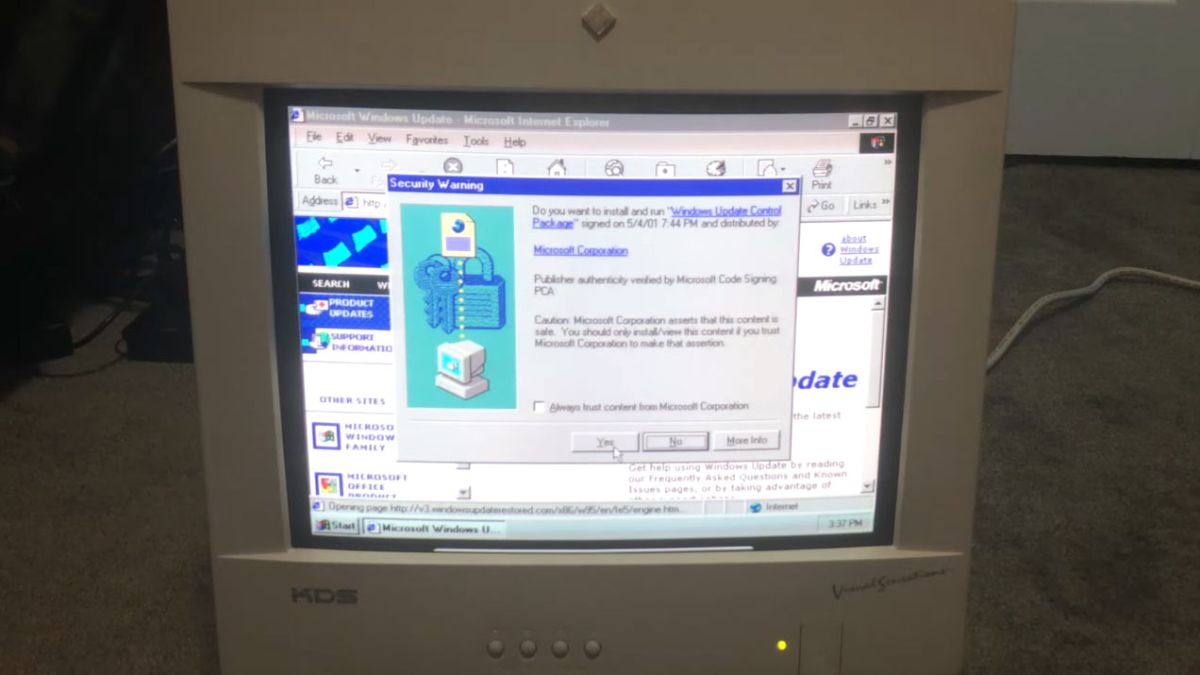For those of you who are old enough to remember: Windows Update used to be a website that scanned your machine using an ActiveX control.
-
The very first time I used the Windows Update site I thought it was the coolest thing ever.
-
A decade later their miserable update process was one of the things that made me hug my Linux box, and cemented my rejection of Windows.
-
A decade after that (still responsible for supporting Windows at work) I could not believe how they’d managed to make it even worse, and continually found myself wondering how Windows users weren’t melting down their customer service lines with complaints.
-
Today I have to admit, “eh, it’s no package manager, but they seem to have made it a lot better.”
Edit: I’m probably using the term “decade” slightly loosely there, but not too much.
-
ActiveX

My work runs some scientific instruments on Windows 3.1 and Windows 98 still. The equipment is from the 80s and cannot be upgraded. To buy a new one costs 5 million dollars. Ironically, when parts break on it now, it’s super expensive to fix because of rarity of parts. Luckily the computers are not on the internet.
No problem with using ancient machines so long as they’re properly air gapped. But, yeah… continuing maintenance is going to get increasingly difficult as time continues to pass.
Hopefully Microsoft don’t sue them. This is really cool
Microsoft hasn’t exactly been sue-happy over update files AFAIK. Someone here can let me know though. There might be an issue with using the “Windows Update” branding though.
FWIW, there’s also Legacy Update which does a similar thing for Windows 2000 and newer.
The referenced windows update website, v3.windowsupdaterestored.com, can’t be loaded on Firefox because it uses vbscript instead of javascript.
I had to do some testing for work the other day (don’t ask) on a Windows 2003 server. This would have saved me 12 hours of banging my head to get the thing patched to current.
Between root certificates and no support for modern TLS, it’s a legit nightmare to get working. I pity the folks that still run production workloads on these operating systems.
Edit: I see 2003 is not yet released for this project but there is another one called Legacy Update that works for 2003.
This is cool for retro computing enthusiasts.
Not just them. There are very likely businesses using them as legacy systems to run machinery they can’t afford to upgrade.
Or that use old machines because they work and their entire workflow is based on it. Like, I remember someone (might have been LGR… it was some retro computing youtuber at least) mention that they knew a print shop or something that was still using like win98 or 2000 for their entire production (as in, handling the printing, setting the size etc.) and maybe even the sales terminal…
And I’ve read horror stories of places like machining shops running their cnc setup off of a win98 machine because the cnc router or whatever it’s called just won’t work over anything but parallel port, or that the software needed for that specific router doesn’t run on newer machines.
The systems running your power grid, your water mains and your local trains are all XP or older.
The old lady behind the counter at our bus station is using dos to print the tickets
DOS rarely fails and is extremely fast.
Yeah she just uses the keyboard to input a few fields very quickly. It’s that machine’s sole purpose. But I assume it’s still connected to some network to get data about ticket availability and I wonder how secure it is.
That’s true as there are still some CNC machine tools that do use Windows 98 and Windows NT.
Hm… I don’t think I ever updated Windows prior to Windows XP cuz I do not remember this website. I grew up with DOS and progressed through every iteration of Windows that existed, too, so it’s not like I am just younger than the service.
Even with XP, I remember having to get a disc mailed to me for SP1 and SP2.
Right, that free update disc! That triggered a forgotten memory.












